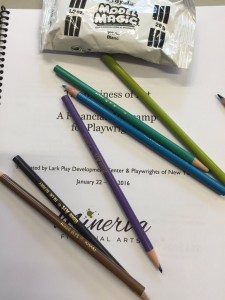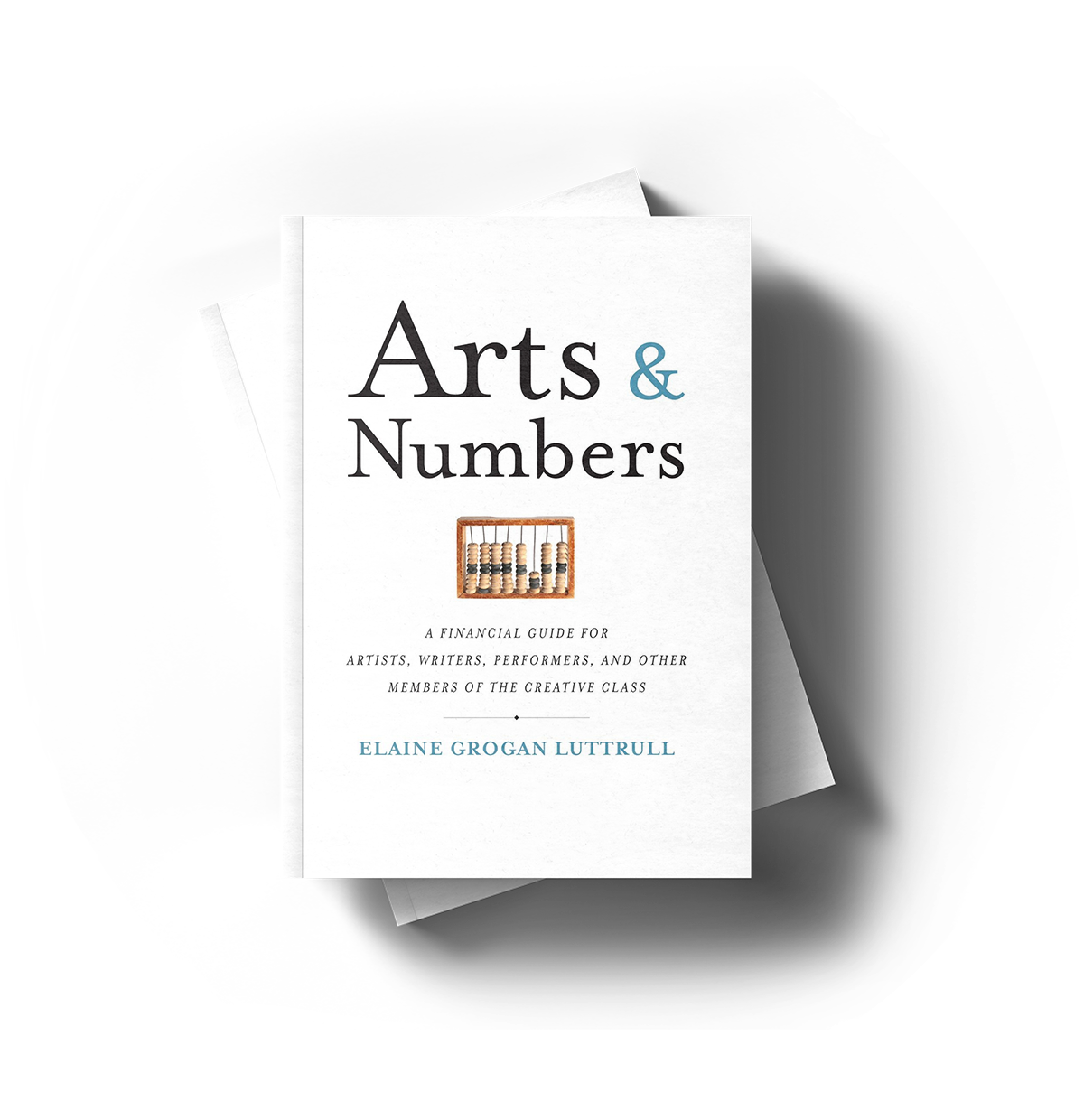January 25, 2016 • Curriculum
In October of 2012, Playwrights of New York and The Lark hosted the first Business of Art workshop, a two-day playwrights-only boot camp that focuses on business and financial aspects of running a creative career.
As we conclude our third fiscal year of Business of Art programming, I reflected on some of the lessons I’ve observed from the 115 playwrights who have participated thus far. These musings originally appeared on The Lark’s blog. Please enjoy!
 Lesson #1: Sometimes Simple Is Stressful.
Lesson #1: Sometimes Simple Is Stressful.
“I just freaked out and then I put penguins everywhere,” confessed a playwright.
This exclamation followed what I’ve learned is actually one of the most stressful parts of the workshop. You’d think building a budget would be the most stressful, or possibly completing a tax return. But neither rivals the stress induced by an exercise in creativity, especially one that includes only vague instructions and a tight time limit.
The point of the exercise isn’t to prompt rioting or harm penguins. (They were stickers, in case you were curious.) The exercise itself actually relates to the budgeting process. It helps participants remember that life is often unpredictable, and rarely comes with sufficient instructions.
But that doesn’t mean we can just wing it. Sometimes our spontaneity is best served by a bit of planning, or at least a safety net.
By including both in your regular creative practice—especially in an authentic way—you will be poised to thrive.
Takeaway: No one knows you better than you. Incorporate your own authenticity into your financial habits. And plan to confront your stressors, especially if they involve penguins.
Lesson #2: Play-Doh Makes Everything More Fun.
It’s squishy; it’s malleable. It comes in fun colors, , and more often than not, it reminds someone of a story about eating it as a child.
It’s amazing what physical engagement can do, whether the engagement is with play-doh, pipe cleaners, wacky tracks, or something else entirely.
Our bodies and our brains respond to such engagement, not only for the soothing physical properties, but for the subconscious ones as well. We remember a simpler time, when play-doh played a more central role in our lives. We’re inspired to build something, and whatever we aim to do seems possible.
After all, it’s only play-doh.
It gives those with more introverted dispositions a way to engage quietly with the room, and its outcome invites praise. We’ve seen flowers, brick walls, human forms, and a series of vinyasas. With play-doh creations of that magnitude, the financial exercises seem simple by comparison.
Takeaway: Empowerment and confidence can be derived from the most unexpected places.
Lesson #3: Experiences Matter.
The playwrights who attend our workshops are just that: Playwrights. But even if each person’s profession is relatively similar, the experiences are anything but.
Some playwrights join the boot camp early in their careers, while others have attained high levels of creative and financial success. Some focus exclusively on theater while others define writing pursuits more broadly. Some subsist entirely on commissions and productions, while still others prefer to focus financial energies in completely unrelated fields.
But what remains consistent across all the different groups of playwrights we have served is this: Each person brings unique experience to the conversation.
We are all experts in our own experiences, and as such, we all have expert tips to share. Joining forces in a relatively intimate group setting allows us to do just that.
I’ve lost track of the number of times I’ve heard variations of “Oh, I never thought of it that way,” or “Oh, that’s really helpful.” Rarely are these musings in response to tax tips or investment lessons. They almost always are in response to a personal experience shared by another playwright.
Because experience matters.
Takeaway: We all have something to contribute, and we all have something to learn.
Lesson #4: Use Two Desks and a Timer.
“That’s brilliant!” a playwright shared with me in the midst of a workshop. I wish it were because of something truly earth shattering I had said. I wish my words rivaled what I’ve seen any of my participants produce on stage.
They don’t. It’s not even close.
All I said was, “Have you tried two desks and a timer?”
Two desks and a timer can really be applied to anything… I’d love to be in the room when a group of playwrights were given that prompt. (I’m already thinking of ideas; none of them are appropriate).
In this particular workshop, we were talking about the challenges of tackling administrative tasks: all those managing, emailing, inbox-cleaning tasks that take uncomfortable amounts of time from our creative pursuits. For some people, the challenge is reserving time for administrative tasks. For others, the challenge is limiting the tasks so they don’t engulf an entire afternoon.
In either case, using two desks and a timer can help.
Takeaway: Plan for and execute necessary administrative tasks, but don’t let them run your creative practice.
Lesson #5: It’s Not Actually About the Money.
The guise of the Business of Art workshop is money management. After all, much of what we cover is money-related. We talk about budgets, cash, financial statements, taxes, investments, and budgets again. (And sometimes a third time just for good measure)
There are plenty of money-related lessons that come from the workshop. We do talk at length about tax deductions and saving receipts.
And yet, this workshop is about so much more than money. Money is our gateway; it’s the low-hanging fruit we use to entice participants to spend two exhausting (read: fulfilling) days playing with play-doh in The Lark’s West Studio.
But money isn’t the secret to this program’s success. Business of Art is about the empowerment and the confidence that comes from confronting a challenging topic, surrounded by allies that form an amazing, intimate community of creative souls.
It is about supporting each other, and supporting the work. It is about gaining literacy in an area we sometimes neglect. It is about deriving power from that literacy. It is about taking control of our decisions, both creatively and financially.
It’s not about the money.
Takeaway: Budget. (Just kidding. It’s not about the money, remember? But you should still budget.)
Lesson #6: I Am Without Fail the Luckiest CPA Ever.
There are plenty of CPAs who love what they do. And I’m happy for them. But they have no idea how much better their professional lives could be.
I am without fail the luckiest CPA ever. I am surrounded by some of the most brilliant, talented, creative people I’ve ever known, and I have the privilege of watching them thrive, both creatively and professionally.
I’ve seen their work, from the roughest drafts to the most polished performances and their words move me deeply, whether written or recited on stage.
Their tweets make me chuckle, and their activism inspires me. Their questions make me think more deeply about connections I had missed, and their hugs fill me with warmth.
Yes, I am indeed the luckiest CPA ever. For with each workshop, and each email, each cup of coffee, and each moment I share with this community, I learn.
They have taught me an immeasurable amount, and for that, I remain eternally grateful.
Takeaway: Surround yourself with kind people who show compassion for others and love what they do. If you pay attention and absorb the lessons they share—intentionally and otherwise—the rest is easy.
For More Info…
For more information on the Business of Art Workshop series at The Lark or to register for a future workshop, please contact Megan at [email protected].
The Business of Art Boot Camp is a co-production of The Lark, Playwrights of New York, and Minerva Financial Arts. It would not be possible without the tireless efforts of all those who have been part of the organizational team.
Thank you.


